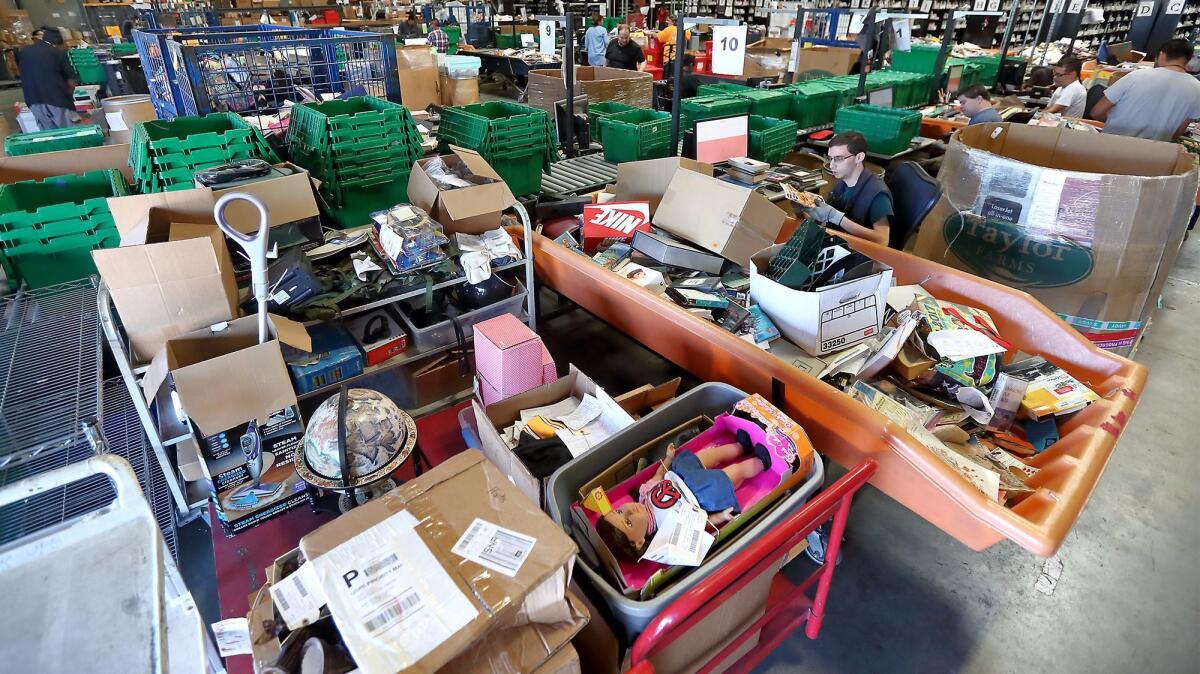Patrice Apodaca: Simplifying your life can be a complex but worthwhile goal

- Share via
As a new decade commences, I have been pondering my priorities for the months and years ahead.
I hesitate to label this internal strategy session as the making of New Year’s resolutions, which are notoriously hard to keep. I prefer to think of it as a goal-setting exercise, which retains the aspirational element of resolutions without the guilt of promises broken or only partially kept.
One of my goals is, I suspect, a common one: I hope to simplify my life.
This seems easy enough. According to Merriam-Webster, the first definition of the word “simplify” is “to reduce to basic essentials.” What could be more straightforward — or more ethically compelling, given that I have far more than I need, while too many lack those basic essentials?
But in a complex world, there’s nothing simple about simplifying.
This thought struck me during a pre-Christmas closet-purging session, after which I drove to a Goodwill donation center in Corona del Mar to drop off some items. When I pulled into the parking lot, I could see a mountain of other donated goods littering the pavement outside the packed Goodwill truck.
“This is what happens when I go to lunch,” the overwhelmed young man who was managing the donation center told me as he gestured to the piles of other people’s unwanted belongings.
Any virtuous feelings I might have harbored quickly dissipated, and I wondered: Would all this stuff find a home? How much of it ends up in a dump? By removing items from my home and giving them to charity, am I truly doing good, or am I just transferring my mess to someone else?
According to HuffPost, most of the tens of millions of tons of clothing donated to Goodwill each year are eventually re-used. But despite Goodwill’s best efforts — including selling languishing castoffs for pennies, auctioning the remaining items in bulk and sending the rest to textile recyclers — a small portion of secondhand clothing does end up being trashed.
This refuse becomes destined to join the many millions of tons of textile waste already clogging landfills. Often this happens when the donated clothes are wet, moldy, or otherwise contaminated.
Obviously, those of us who give away our castoff clothes should make sure they are clean and usable. But a better solution to the clothing waste problem, the HuffPost article suggested, is to forgo buying clothes we don’t really need in the first place.
Sigh.
This is not advice that a clothes lover like me wants to hear. I get a unique thrill from tracking fashion trends, perusing the websites of my favorite retailers, waiting patiently for sales, cashing in my “preferred customer” bonus points and wearing my cute new outfits. Obsession is such a strong word — let’s call it an avocation, one that delights me like no other.
Add to that my attachment to other consumer goods — from shoes to books to a surfeit of ornaments that threatened to cause my poor Christmas tree to implode this season — and I realize that scaling back to “basic essentials” is probably a bit ambitious.
Yet I know I can do better. I can avoid impulse buying and give greater consideration to whether adding something to my collection of stuff will really make a difference in my life. I also could spend a bit less time drooling over clothes and more time finding ways to truly help those in need.
There are other ways I can, and should, seek greater simplicity.
Experts, including psychologists and organizational specialists, recommend mental and social decluttering too. This means trying not to dwell on regret or self-pity, and setting boundaries with people who feed such negativity. The focus should instead be on promoting a healthier attitude based on gratitude and compassion.
Simplifying also requires better time management. I often become stressed from feeling over-committed, and I worry that I won’t fit it all in. Yet in truth much of that busyness is self-inflicted and unnecessary, driven by some ridiculous notion that we are all in a race to cram more into each day than everyone else.
I’d like to break that competitive loop and stop doing some things just so I can say that I did them. Better to spend my precious time on Earth tending to what matters most, family and friends, and appreciating the simple pleasures — like a glorious sunset or the beautiful flowers in the garden that my husband nurtures.
Will I succeed at any of this?
Perhaps a little, but I know too well how easy it is to succumb to the belief that having more and doing more will make me happy and fulfilled. Instant gratification is seductive.
So I’ve decided that my goal could use an amendment. In service of working to achieve greater simplicity, I also should try to think more. Think before clicking, buying, speaking, committing, judging or indulging. Think before adding to a problem, rather than helping find solutions.
Taking an extra beat or two to remind myself that I already have so much — that’s a goal I feel confident I can achieve. In fact, it should be simple.
All the latest on Orange County from Orange County.
Get our free TimesOC newsletter.
You may occasionally receive promotional content from the Daily Pilot.




